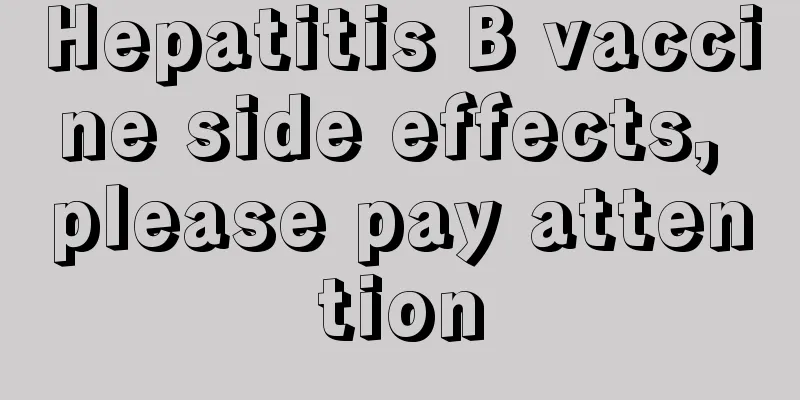Hepatitis B vaccine side effects, please pay attention

|
Hepatitis B is highly contagious. The easiest way to prevent hepatitis B is to get vaccinated. You will not get hepatitis B in your lifetime. By getting vaccinated, the body produces antibodies to avoid hepatitis B. Although the effect is very good, people can't help but worry about whether there will be side effects. Let's learn about it together below. Hepatitis B vaccine is a special medicine used to prevent hepatitis B. After vaccination, the immune system can be stimulated to produce protective antibodies. These antibodies exist in human body fluids. Once the hepatitis B virus appears, the antibodies will immediately take effect to eliminate it, prevent infection, and will not harm the liver. This will enable the human body to have immunity to prevent hepatitis B, thereby achieving the purpose of preventing hepatitis B infection. Vaccination against hepatitis B is the most effective way to prevent hepatitis B virus infection. Local discomfort There may be mild inflammatory reactions such as redness, swelling, heat, and pain at the injection site, or local adverse reactions such as local lymph node enlargement or lymphangitis, but they are all temporary and will disappear on their own within 48-72 hours. No special treatment is needed, just hot compress. Overall discomfort Symptoms include headache, dizziness, fever, fatigue, drowsiness, and general discomfort. Some people also experience gastrointestinal discomfort symptoms such as nausea, vomiting, abdominal pain, and diarrhea. However, these are usually only temporary and disappear within 24 hours. Precautions The antibodies produced by the injection of hepatitis B vaccine do not exist permanently in the body. The antibody titer will slowly decrease over time. When the antibody titer drops below 10, the hepatitis B vaccine booster shot should be actively injected. People with fever (basal body temperature > 37.5℃), persistent or severe diarrhea, hepatitis, blood disease, bronchial asthma, allergic urticaria or other acute or chronic serious diseases should not be vaccinated. Bronchial asthma Newborns born abnormally, such as those with low birth weight, premature birth, or caesarean section, should not be vaccinated for the time being. It is recommended to postpone the vaccination time. People who receive measles vaccine should avoid receiving hepatitis B vaccine during the same time period. People who are allergic to drugs such as penicillin, sulfonamide, formalin, or those with other types of allergies should not be vaccinated. |
<<: Can hepatitis B virus carriers have children?
>>: What are the characteristics of a grand mal seizure
Recommend
Will smoking cause allergies?
Smoking is an addictive behavior, mainly because ...
What should I do if I don’t have enough physical strength to play basketball?
If you have poor physical strength when playing b...
Why do fingers go numb? These diseases are the most common
Sometimes you may find your fingers are numb. In ...
Symptoms of rhinitis and methods to stop runny nose caused by rhinitis
Autumn is the peak season for rhinitis, but now t...
What are the contraindications of taking gout medicine
Gout is a type of joint disease, and its symptoms...
What is the reason why the lump in the neck due to thyroid cancer becomes smaller?
The reduction of the neck lump of thyroid cancer ...
What are the stages and grades of lung cancer
How is lung cancer staged and graded? Arabic nume...
Which hospital is best for treating breast cancer
Breast cancer is the most serious lymphatic disea...
What is the length of the scar from hemisection of thyroid cancer
After hemisection of thyroid cancer, the length o...
How to effectively prevent lung cancer? Several things you must know about preventing lung cancer
How can we effectively prevent lung cancer? In li...
What are the consequences of taking birth control pills by mistake?
Generally speaking, taking birth control pills by...
What is the basic life expectancy of patients with thyroid cancer?
With the development of society, various pollutio...
Do you wear underwear when you sleep at night?
Many women sleep naked, saying that it is good fo...
To prevent breast cancer, pay attention to these three signs, early treatment and early recovery
How can female compatriots prevent breast cancer?...
Some related contents about Chinese medicine treatment of laryngeal cancer
Clinically, the treatment of laryngeal cancer is ...









